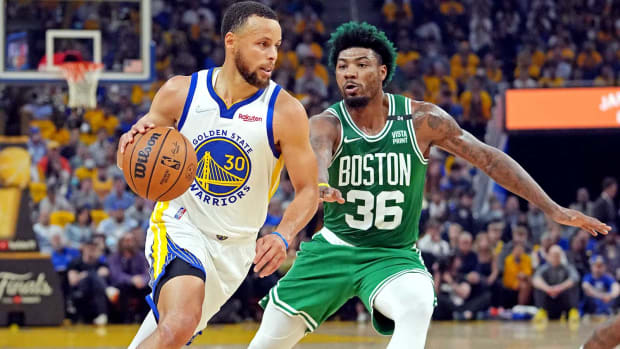SAN FRANCISCO – For sheer audacity, entertainment value and emotional jolt, you’d have a hard time beating Jordan Poole’s in-and-out-dribble-into-crossover-into-three-point swish from just inside halfcourt as the third-quarter buzzer sounded here Sunday night.
It was a spectacular sequence—exhilarating for the Warriors, a psychic blow to the Celtics and a prime highlight in Golden State’s 107-88 rout in Game 2 of the NBA Finals. Poole skipped high as the ball passed through the net, then coolly smiled, strutted and cocked his head to the side. A beaming Stephen Curry promptly met him for a high five and a fierce hug.
Crowd: elated. Series: tied. Warriors: relieved.
But that breathtaking shot and the lopsided final score obscure what’s become, perhaps, a concerning new reality for the Warriors: For the first time in their eight-year dynastic run, they don’t have a reliable second option.
Curry was electric Sunday, scoring 29 points in just 32 minutes of work, earning a rest for the entire fourth quarter. The defense did the rest, holding the Celtics to 64 points through three quarters as the Warriors built their massive lead.

Kyle Terada/USA TODAY Sports
It was a winning formula for one night. But it’s become increasingly clear that the Warriors’ margin for error is much slimmer now than in any of their five prior Finals—because, really, they are more reliant on Curry now than they’ve ever been.
Through two games, Klay Thompson is averaging just 13 points on 30 percent shooting (27 percent from three). Poole broke out for 17 points on Sunday, but his final 8 points came in the fourth, with the game already out of reach and the Celtics’ entire starting lineup on the bench. Andrew Wiggins, who had a stout 20 points in Game 1, followed with 11 points in Game 2.
In prior runs, the Warriors were powered by Curry and Thompson’s shooting, then by Curry and Kevin Durant (with a nice dash of Thompson on top). But now? Now each game is a mystery. Can Wiggins consistently get to the basket? Can Poole recapture the magic of April and early May? Can Thompson—who spent two years recovering from major surgeries before returning in January—regain his pop in this series?
“I think it’s different,” Curry said, “just because of the way the team is constructed. There’s always the need for me to be aggressive, try to play-make, try to score. … I guess you compare it to years past, with the depth that we had, with the heavy load of scoring me, KD, Klay had, obviously looks a little different, and the game flows a little different.”
The good news for the Warriors? Curry is clearly up to the task. He put up 34 points in Game 1, which might have been enough had the Warriors’ defense not collapsed in the fourth quarter. But it’s also worth noting that Curry scored just 4 points in that fourth quarter, and the Warriors had nowhere else to turn.
Watch the NBA Finals online with fuboTV: Try for free!
“I think our offense is always a lot of Steph,” said Draymond Green, who had 9 points on Sunday. “Even when KD was here, our offense still started with Steph. That’s the way it’s going to be.” But, Green quickly added, “When you’re playing against a team like (Boston), you have to get offense from other places and not just Steph. I think for the most part we did a pretty good job of that.”
It helped that the Celtics’ offense thoroughly sputtered, outside of Jayson Tatum (28 points). Jaylen Brown, the hero of Game 1, had just 17 points on 5-of-17 shooting in Game 2. Al Horford, Marcus Smart and Derrick White all came back to Earth, as Green kinda-sorta predicted they would.
Still, with the Finals shifting to Boston for the next two games, the question becomes how much more Curry can do, and whether he’ll get enough help to steal a road win and take back the home-court advantage in the series.
“There’s plenty of concern about plenty of things,” coach Steve Kerr said. “Boston is a hell of a team. They have a great defense. They have got guys who are athletic and powerful and can get to the rim. We’re going to need contributions from a lot of people, and I think we’re perfectly capable of winning games where Steph doesn’t have a huge night.”
That’s been their history, anyway. Seven years ago, the rallying cry was Strength in Numbers-with guys like Draymond Green, Harrison Barnes and Andre Iguodala providing enough collective pop to support Curry and Thompson. And of course, it was Iguodala who won MVP—averaging 16.3 points to go with his defense on LeBron James—of that first championship in 2015. Thompson averaged 15.8 points in that series.
In 2016, the Warriors got 19.6 points per game from Thompson and 16.5 per game from Green. In the 2017 Finals, it was Curry (26.8 points per game) supporting Durant (35.2 points), with Thompson adding 16.4. In 2018: Durant 28.8, Curry 28.5, Thompson 16. Even in their 2019 Finals loss to Toronto, the Warriors got a strong offensive push from Curry (30.5) and Thompson (26), with Durant missing much of the series.
Once, the Warriors were defined by Curry and Thompson’s twin attack from the arc. They were the Splash Brothers, dazzling everyone with their lethal shooting, burying teams under a hailstorm of threes. At the moment, Curry looks like a solo splasher, an only child. He’s on track to claim his first Finals MVP—if the Warriors can just give him enough help to win three more games.







